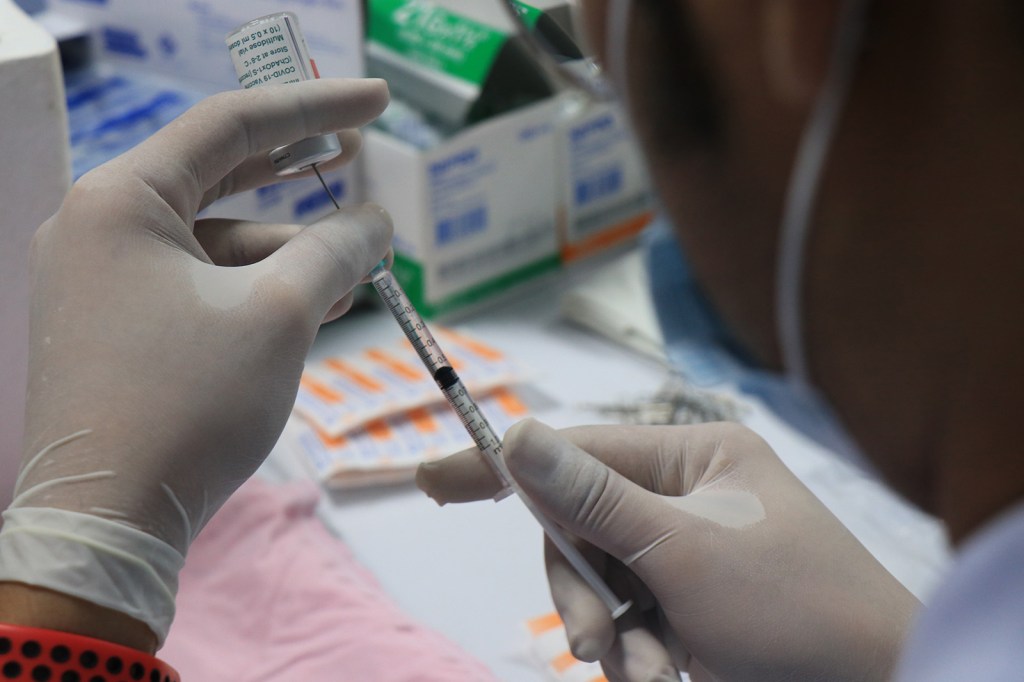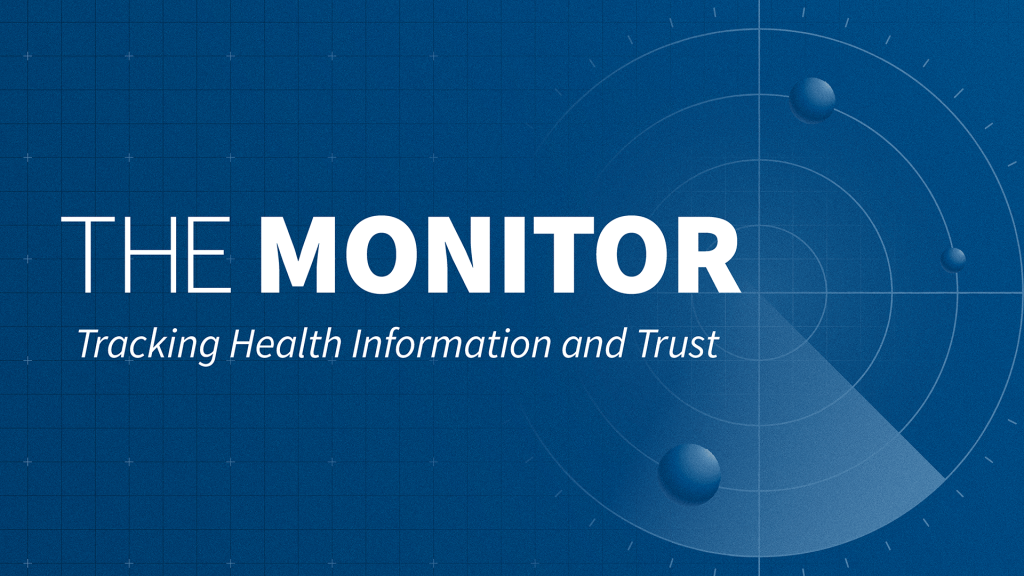VOLUME 24
Flawed Report Aims to Undercut Established Research on Abortion Pill Safety, Plus How a Federal Initiative to Study Autism May Overemphasize Environmental Toxins
Summary
This volume highlights how a report criticized for flawed methodology is influencing renewed efforts to restrict access to the abortion pill, mifepristone. It also explores how a federal plan to study the causes of autism could be contributing to stigma by over-emphasizing environmental toxins and examines the resurgence of false claims about fetal tissue in vaccines following comments from Robert F. Kennedy Jr.
Recent Developments
Flawed EPPC Report Aims to Cast Doubt on Long-Standing Research Documenting Abortion Pill Safety
An April report from the Ethics and Public Policy Center (EPPC), which has been met with criticism over its methodological rigor and lack of data transparency, has led to renewed calls for the FDA to restrict access to mifepristone, the abortion pill used in nearly two-thirds of U.S. abortions. The group, which describes itself as working to “push back against the extreme progressive agenda,” analyzed an undisclosed source of insurance claims and reported that almost 11% of patients who took mifepristone experienced a serious adverse event, contradicting the well-established safety profile of the drug. Mifepristone, used alongside misoprostol to terminate pregnancies, has been approved as a safe and effective drug by the Food and Drug Administration (FDA) since 2000. The FDA prescribing information notes that 10 clinical trials with collectively more than 30,000 patients found that serious adverse effects occur in fewer than 0.5% of patients. Other studies have found similar rates, and an analysis of more than 100 studies found that, in the vast majority, more than 99% of patients had no serious complications. Although the new report is framed as research-based analysis, the president of the American College of Obstetricians and Gynecologists and other reproductive health specialists say it lacks transparency and overstates risk by relying on broad and undisclosed diagnosis codes, including events not clearly tied to the drug, like ectopic pregnancies.
Despite being widely criticized for methodological flaws, lack of transparency, and distortion, findings from the report have been used to amplify false claims that mifepristone is unsafe. Mentions of abortion pills in news and on the platform X spiked on April 28, the day the report was released, marking one of the largest spikes for abortion pill mentions in 2025 to date, with a smaller spike following on May 6. Safety of mifepristone was a dominant theme in these posts – between April 28 and June 1, mentions of safety were found in approximately a quarter (26%) of X posts identified in our search on the topic, compared to just under 4% in the period before. Many of the posts cited the report’s false claims that “serious complications from abortion pill are 22x higher than FDA reports.” Commenters on X posts sharing the study repeated the false claim that medication abortion is unsafe along with other common myths about mifepristone, including the incorrect claim that it causes infertility.
The report has been cited in calls to review federal regulations surrounding mifepristone, including from anti-abortion U.S. representatives on social media. Although FDA Commissioner Marty Makary had previously said in late April that the agency had no plans to restrict the availability of mifepristone unless new evidence came to light, the FDA now plans to begin a complete safety review.
Polling Insights: A March 2024 KFF Health Tracking Poll found that most of the public oppose banning mifepristone but partisans are divided on the question. Overall, two-thirds of U.S. adults say they oppose banning the use of mifepristone, or medication abortion, nationwide with about a third (32%) saying they would support such a ban. The share who support banning mifepristone rises to half among Republicans (50%) compared to far fewer Democrats (23%). Among both men and women, majorities say they would oppose a law banning mifepristone.
In addition, KFF’s May 2023 Health Tracking Poll found that most U.S. adults (55%) say medication abortion pills are either “very safe” (30%) or “somewhat safe” (25%) when taken as directed by a doctor, but about one-third (35%) of the public say they are not sure. Very few believe the pills are unsafe. Similar to views on banning mifepristone, partisans are divided on whether medication abortion is safe, with majorities of Democrats (72%) and independents (58%) saying medication abortion pills are safe compared to less than half of Republicans (40%). Views also differ by gender, with somewhat larger shares of women than men saying medication abortion is safe (59% v. 50%).
Claims that Autism is Caused by Environmental Factors Center Around Vaccines
In April, the National Institutes of Health (NIH) and Centers for Medicare & Medicaid Services (CMS) announced a plan to create a “real-world data platform” using information from Medicare and Medicaid enrollees to allow researchers to study the causes of autism. The project links autism to “environmental toxins,” but previous research has shown that there is no single cause for autism, and most risk factors exist before birth.
Although scientific consensus points to a strong genetic basis for autism, the federal initiative has sparked an uptick in social media posts discussing claims that autism is caused by preventable environmental factors. Among the most common factors linked to autism by some social media users were a person’s gut microbiome, chemical exposures in the environment, and, most frequently, vaccines. Vaccines are rarely mentioned in official announcements of the initiative, but they commonly appeared in reactions to the project. Since early May, approximately 34,000 news articles and social media posts identified by KFF tracking across platforms mentioned the federal autism study. While few posts referenced environmental toxins, approximately 10,000 of the 34,000 posts discussed vaccines and autism. Another dominant theme was privacy concerns, as most social media posts suggested that an “autism registry” could be used to discriminate against adults and children with the diagnosis. Autism advocates continue to warn that framing autism as preventable could place undue blame for autism diagnoses on parents and contribute to stigma. KFF’s April 2025 Tracking Poll on Health Information and Trust found that most adults (63%) and parents (61%) say they have heard the myth that measles, mumps, and rubella (MMR) vaccines have been proven to cause autism. While very few adults say this false claim is “definitely true” (3%), most express uncertainty and say it is either “probably true” (21%) or “probably false” (41%).
False Claim About ‘Fetal Debris’ in Vaccines Resurfaces
The false claim that certain vaccines, like the measles, mumps, and rubella (MMR) vaccine, contain fetal debris gained traction online throughout May as social media users reacted to statements made by HHS Secretary Robert F. Kennedy Jr. The claim, which has circulated in various forms before, has been refuted by virologists and vaccine development specialists. Some vaccines, including the rubella component of the MMR vaccine, are developed using fetal cell lines originally derived from fetal tissue decades ago, but no fetal tissue or “debris” is present in the final vaccine.
Online mentions of fetal debris in vaccines were rare before April 30, but posts about this claim spiked on May 1 as users shared clips of Secretary Kennedy’s comments in an interview. Mentions spiked again on May 10 and May 14, following similar statements shared during another news interview and later reiterated during his Senate testimony. Social media users reacted to this statement by both debunking the claim and expressing concern over vaccine ingredients. The narrative especially resonated with religious attitudes towards abortion, exemplified by one influencer with more than 500,000 followers on X writing, “I hope everyone understands the correlations as to why Democrats and Planned Parenthood are so hell bent on ‘Abortion access’. It’s all connected… it’s all satanic.”
AI & Emerging Technology
Study Highlights Use of Retrieval Augmented Generation to Improve AI Fact-Checking
Traditional generative AI models like OpenAI’s ChatGPT or Google’s Gemini produce answers based on patterns learned during training, limiting their usability for fact-checking and increasing the risk of inaccurate outputs or “hallucinations.” By contrast, a technique called retrieval-augmented generation (RAG) introduces an external source of information. Before generating a response, the AI consults a curated database of documents to support its answer.
A study published in Journal of Medical Internet Research tested the use of RAG systems to fact-check claims relating to COVID-19. Researchers combined a large language model with a RAG system linked to a repository of about 130,000 peer-reviewed scientific papers from PubMed and Scopus. The results showed that fact-checks produced using this method were more accurate than those generated by the standard chatbot, and that these responses provided important contextual information from scientific papers when available. The authors argue that such tools could help counter false claims more efficiently, especially in fast-moving public health crises. But they also note limitations: the system depends on published research, which can lag behind falsehoods, and the quality of the answers depend on the quality of the papers included in the dataset.
Support for the Health Information and Trust initiative is provided by the Robert Wood Johnson Foundation (RWJF). The views expressed do not necessarily reflect the views of RWJF and KFF maintains full editorial control over all of its policy analysis, polling, and journalism activities. The Public Good Projects (PGP) provides media monitoring data KFF uses in producing the Monitor.







